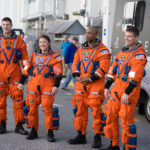They say that going to space changes you. The idea is that people get a new perspective from seeing our world from above. It’s called the Overview Effect. But a new project offers clues to how spaceflight also changes our bodies. This Space Omics and Medical Atlas — or SOMA — has measured a broad range of effects.
Researchers have studied spaceflight’s effects on health since the dawn of the Space Age. They’ve looked into the effects of weightlessness, space radiation and other out-of-this-world conditions as people have rocketed into low-Earth orbit — and sometimes spent months there.
Well-known problems include bone loss and an increased risk of cancer. But there have been signs of vision impairment and drops in certain types of brain tissue. It may weaken immunity and change the switches that turn on genes.
What’s not always been as clear is what might be changing at a molecular level. SOMA hoped to find out.
Do you have a science question? We can help!
Submit your question here, and we might answer it an upcoming issue of Science News Explores
The project’s new data come from short stays, such as travel into orbit via Axiom missions (Ax-1 and -2) and SpaceX’s Inspiration4. Additional data came from some missions by NASA and the Japanese Space Agency.
SOMA’s initial findings appear as a series of 30 papers. They came out June 11 in various Nature journals. And already, they make up the largest published database on aerospace medicine and space biology.
Professional astronauts working for government space agencies must undergo rigorous tests to screen for potential health problems. The same is not true for private space travelers. And that’s why SOMA’s data are so important. A major shift is underway in human spaceflight: the rise of commercial space tourism.
Astronaut Mark Kelly gives himself a flu shot in 2015 while taking part in NASA’s Twins Study. While Mark remained on the ground, his twin Scott spent a year in space. By comparing how the health of each twin changed over that year, researchers investigated the impact of space travel on the body.NASA
Space lengthens DNA ‘caps’
Perhaps the most well-known long-term biomedical NASA study involved identical twins. Scott and Mark Kelly both trained as astronauts. Scott spent 340 days on the International Space Station. Afterward, researchers looked at how that affected his physiology, gene expression, immune system and mental reasoning. To better understand any changes, they compared these features to those in Mark, the twin who stayed on the ground.
One fascinating finding: Space travel lengthened Scott Kelly’s telomeres. These are short bits of repeating nucleic acids. Found at the ends of our DNA, they act sort of like the cap on a shoelace. They protect our strands of DNA. As cells divide, telomeres shorten. It’s a change generally linked with aging.
So did Scott’s stay in space make his body seem younger? No. In fact, the telomere change may increase his risk of cancer.
Certain cancers “protect telomere lengths or cause telomere elongation,” explains Eliah Overbey. At the University of Austin in Texas, she studies the health effects of spaceflight. “That’s part of why these cancers are tricky,” she says. “They’ll divide, divide, divide — but their telomeres aren’t getting any shorter.” Fortunately for Scott Kelly, once back on Earth, his telomeres shrank back to their preflight size.
Still, this experiment was limited by its tiny sample size: two men. “NASA didn’t repeat these sorts of studies on their future crews,” Overbey notes.
Mission commander Jared Isaacman, a tech entrepreneur, works alongside medical officer Hayley Arceneaux on Inspiration4, a private space mission. The two performed science experiments during their three days in space.Inspiration4/SpaceX
What SOMA found
Through SOMA, Overbey and her colleagues have now collected many types of molecular data. That includes telomere length. Other examples are immune responses and the body’s ability to repair DNA and manage stress.
Even a few days in space can trigger genetic changes, SOMA’s data show. In fact, short-term changes differed little from ones seen during longer missions.
As with Scott Kelly, telomeres of the Inspiration4 crew got longer during their jaunt. “Even though they were only up there for three days, we were actually still able to see what was a pretty dramatic effect,” Overbey says. Once they got back on the ground, though, their DNA-cap lengths went back to normal.
Many other molecular changes also followed patterns similar to those in the Twins Study. They seemed to shift during spaceflight — regardless of its length. Then they largely went back to baseline once the travelers were back on Earth.
What do such data mean for an astronaut’s health? That isn’t clear, especially when thinking about the long timescales of a Mars mission or a stay at a moon base. And the total number people going to space is still small. After all, each new private mission carries only a crew of four.
Still, Overbey and her team intend SOMA to become a hub for health data on commercial and government crewed missions.
In an April 24 TED Talk, this Brown University student extols the wonders and promise of space tourism, from the first trip (which cost $20 million) to her vision for lowering that cost within 10 years — to $100,000. That’s a bit more than twice as much as today’s most expensive plane ticket.
Few health guidelines for space tourists
An increase in space tourism poses many ethical issues. To get into orbit, professional astronauts must undergo a lot of training and be in tip-top health. The U.S. government has no health requirements for space tourists.
Twenty years ago, Congress passed a temporary ban on new human-safety rules for commercial space travel. It didn’t want to interfere too much as the private space industry was starting to develop. That ban was set to expire in 2012. Instead, it has been extended — most recently to January 2025. And some bills, if passed, would push this date back for up to six more years.
This means that the Federal Aviation Administration, or FAA, which oversees launch licenses, can’t make private “astronauts” undergo health tests before strapping into a rocket seat.
“If you want to climb Mount Everest, you need to submit a health certificate,” notes Dana Tulodziecki. “That’s more than you currently officially need to do to go to space,” says this philosopher. She works at Purdue University in West Lafayette, Ind.
The FAA suggests that private astronauts consult with their doctor before signing up to travel. Preferably, that doctor should be trained in spaceflight issues. But no one can ensure that happens. And even if a doctor said a tourist wasn’t healthy enough to rocket off, that person could simply keep asking around until they found a doctor who gave them an okay.
“These are obviously really complicated issues,” Tulodziecki says. She thinks that before the ban ends, lawmakers should consider what laws might be needed to ensure the safety of tourists who want to buy a ticket to space.
This isn’t an issue of theoretical risks that might play out one day in the distant future. “It’s already happening,” she says of space tourism. “So, it’s really something urgent.”





Leave a Reply
You must be logged in to post a comment.